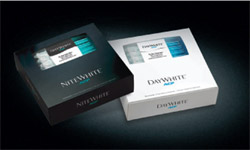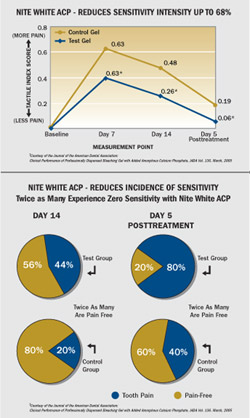Take-Home Whiteners with Amorphous Calcium Phosphate (ACP): Patented New Technology Enhances Whitening Results
Some doctors believe that take-home products are simply a peroxide gel for whitening teeth—that “they’re all the same these days.” But quite the opposite is true. New advances in technology have paved the way for a generation of take-home whiteners that can actually be good for patients’ teeth while also giving them a brighter smile. Not only do these new advances provide new levels of sensitivity relief, they also offer additional benefits to the patient.
One of these technologies is amorphous calcium phosphate, or ACP. ACP has been clinically proven to not only greatly reduce sensitivity, but also to rebuild tooth enamel through a process called remineralization, reduce the fadeback often seen after whitening treatments, and add a lustrous shine to teeth.
Discus Dental, Inc, has introduced the first and only take-home whiteners to combine leading bleaching formulas with ACP—Nite White® ACP and Day White® ACP (Figure 1).
REMINERALIZE WHILE WHITENING
ACP is unique among the calcium phosphate technologies because it forms faster intraorally.1 This allows ACP to deliver the most calcium and phosphate ions in the shortest time. Once formed, ACP converts rapidly to apatite, the tooth mineral. The deposition of hydroxyapatite onto teeth rebuilds enamel through a process called remineralization.
Preliminary research has shown that the addition of calcium phosphate to a whitening agent reduces the susceptibility of enamel to in vitro lesion initiation and progression.2 Introducing ACP onto a tooth surface will lead to rapid deposition of a new coating of hydroxyapatite over the original tooth surface.3,4 At normal oral pH and temperature, the addition of ACP components to the salivary system can cause the hydrolysis of ACP to apatite within a few minutes, which is roughly 20,000 times faster than normal physiologic formation of apatite.5 Besides adding to the external resistance of the teeth by building a barrier of acid-resistant hydroxyapatite, ACP also biases the remineralization/demineralization equilibrium by releasing essential ions that favor remineralization by increasing the degree of saturation with respect to hydroxyapatite.
SENSITIVITY MANAGEMENT
Nite White ACP and Day White ACP contain three desensitizers—potassium nitrate, fluoride, and ACP. No other whitener on the market has these three leading ingredients in it—thus making Nite White ACP and Day White ACP unique.
Tooth enamel is composed almost entirely (97% by weight) of a calcium phosphate mineral in the form of carbonated hydroxyapatite. The ACP rapidly hydrolyzes to form hydroxyapatite. ACP precipitates on the surface and within the lumens of open dentinal tubules to occlude, resulting in reduced sensitivity.
In fact, Discus Dental believes so strongly in ACP, that it is planning to release it as a stand-alone product for sensitivity management and relief.
ENHANCING THE WHITENING RESULTS
Clinical studies have shown that patients who whiten their teeth have some fadeback after treatment (Figure 2 and 3). Using a whitener with ACP reduces the amount of fadeback posttreatment. In clinical tests, patients who used Nite White ACP experience less fadeback 6 months after treatment compared to patients who used Nite White without ACP.6
Whitening with Nite White ACP and Day White ACP also adds to the improved cosmetic appearance of patients’ teeth by increasing the actual shine of teeth. ACP has been clinically shown to improve the smoothness and luster of teeth by filling superficial tooth defects, thus improving the overall smoothness and luster of patients’ smiles.7
TAKE-HOME WHITENING OPTIONS
Nite White ACP combines the benefits of Discus Dental’s innovative carbamide/hydrogen peroxide blended formulas, with the exclusively licensed, patented ACP technology, potassium nitrate, and fluoride to provide a new standard in patient comfort and results. Options include:
- 10% and 16% concentrations worn overnight, and a 22% concentration worn 1 hour a day.
- a special, high-performance blend of 6% hydrogen peroxide and a patented activation matrix that whitens an average of 6 shades in only 3 overnight applications.
Day White ACP is perfect for patients uncomfortable with extended tray wear. Day White ACP is available in two concentrations: 7.5% and 9.5% hydrogen peroxide, both worn 30 minutes, twice a day.
Both Nite White ACP and Day White ACP come in a variety of kit configurations. Kits are available with four to 27 whitening applications, with either a multidose syringe, or a new unit-dose syringe.
CONCLUSION
There are many choices in take-home whiteners today—so many, in fact, that some consider the category to be full of products without much innovation or differentiation. Discus Dental, Inc, is the worldwide leader in whitening and continues to pursue new technologies to improve the whitening process and results for dentists and patients alike. Nite White ACP and Day White ACP are two such products offering the latest in take-home whitening advancements that focus on delivering an effective whitening treatment while also offering the added benefits of remineralization and sensitivity management with amorphous calcium phosphate.
References
1. Charig A, Winston A, Flickinger M. Enamel mineralization by calcium-containing-bicarbonate toothpastes: assessment by various techniques. Compend Contin Educ Dent. 2004;25(9 Suppl 1):14-24.2. Litkowski LJ, Quinlan KB, Ross DR, et al. Intraoral evaluation of mineralization of cosmetic defects by a toothpaste containing calcium, fluoride, and sodium bicarbonate. Compend Contin Educ Dent. 2004;25(9 Suppl 1):25-31.
3. Schemehorn BR, Orban JC, Wood GD, et al. Remineralization by fluoride enhanced with calcium and phosphate ingredients. J Clin Dent. 1999;10(1 Spec No):13-16.
4. Zhang L, Li Z, Dong Y, et al. Experimental study of phosphopeptide in promoting tooth remineralization. J Dent Res. 2000 May;3(1):27-30.
5. Grant LP, Thompson A, Tanzer JM. Caries inhibition in rats by a remineralizing toothpaste. J Clin Dent. 1999;10(1 Spec No):30-33.
6. Date on file with Discus Dental.
7. Forward GC. Non-fluoride anticaries agents. Adv Dent Res. 1994;8(2): 208-214.
For More Information
Discus Dental, Inc
Phone: 1-800-422-9448
Web: www.discusdental.com
 Figure 1 The packaging for Nite White and Day White. |  | |
| Figure 2 and Figure 3 Study examples of how effective Nite White is at reducing the incidence of sensitivity. |



